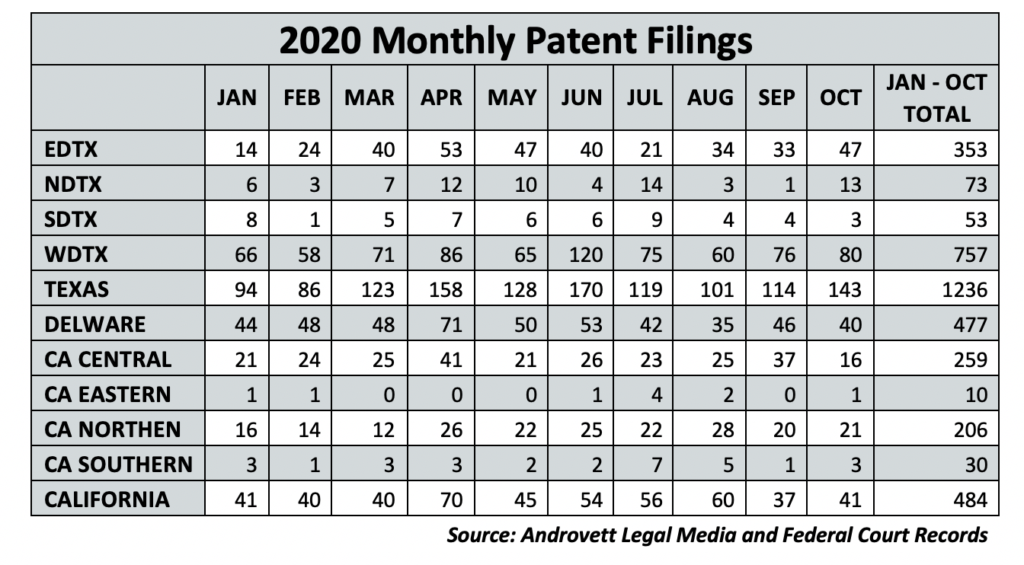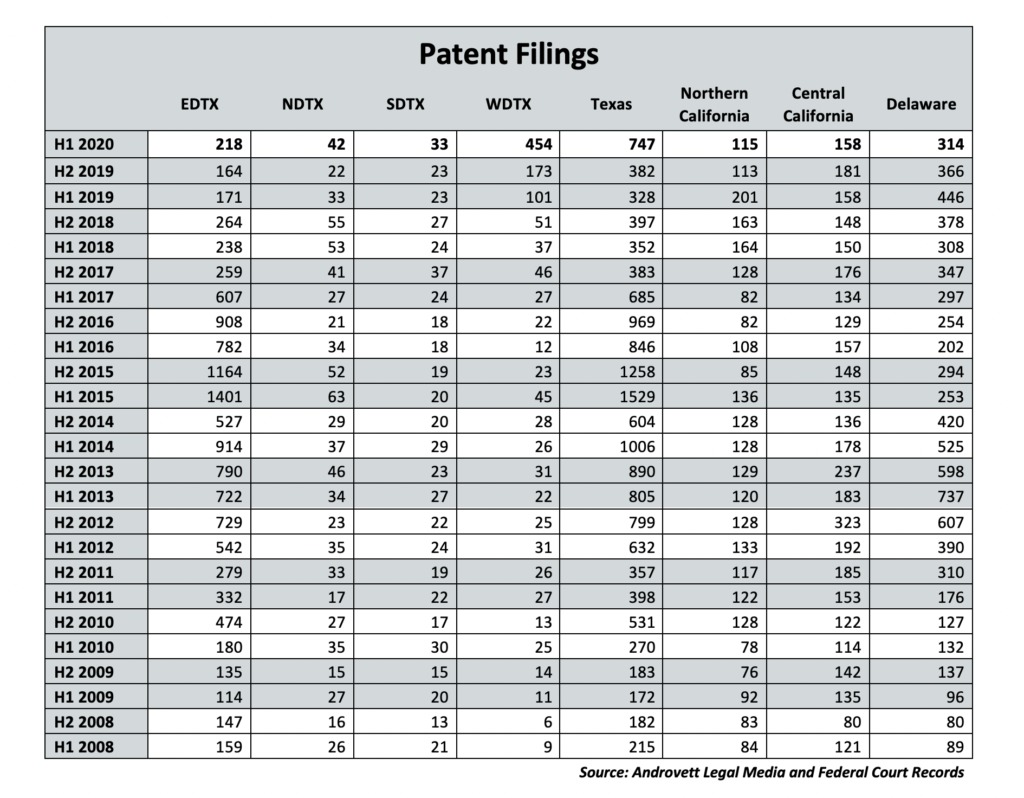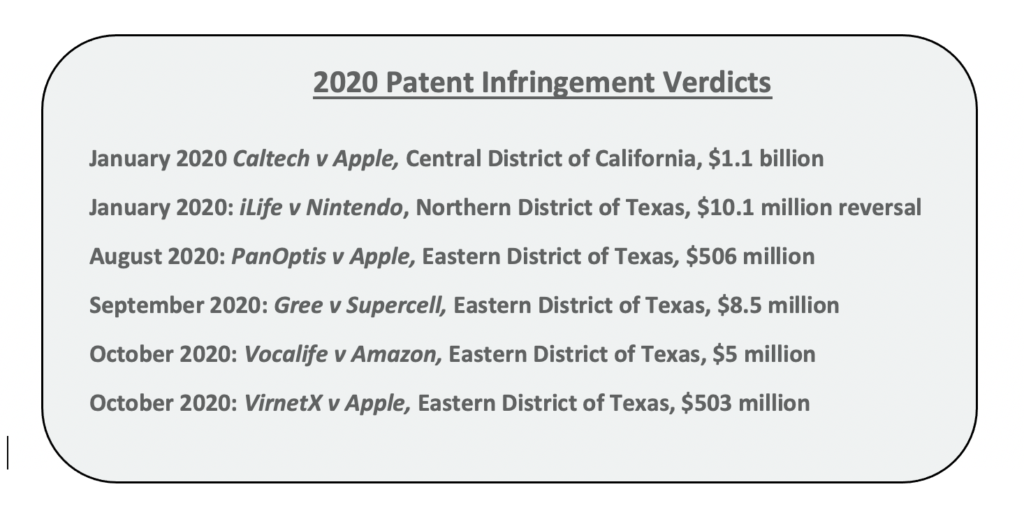California is the home of Silicon Valley, Big Tech and innovation. New York has the big banks. Delaware is where all the companies are incorporated.
But Texas is clearly the place to go to legally protect your intellectual property.
Especially Waco, the birthplace of Dr Pepper, the death place of two-dozen ancient Mammuthuss, the scene of the Branch Davidian and Twin Peaks biker gang tragedies and, now, the patent litigation capital of the world.
In fact, some Dallas law firms expect to open branch offices in Waco in 2021.

New data shows that patent infringement lawsuits filed in Texas by individuals, businesses and nonprofit organizations such as universities and research institutions have skyrocketed each of the past two years.
The federal courts in the Lone Star State are handling about 40% of all lawsuits filed by inventors and holders of registered patents against large and midsized companies in the entire U.S.
The coronavirus pandemic, which has shut down many courtrooms and closed most law firm offices across Texas, has been no barrier to lawyers and their clients filing new claims that their patented inventions and lines of original code have been violated, stolen or used without a licensing agreement.
“COVID has impacted a lot of things, but it has not slowed down the filing of new patent cases in anyway,” said Bill Munck, managing partner of Munck Wilson Mandala in Dallas and a nationally recognized expert in intellectual property law. “If anything, the pandemic has caused the number of patent cases to increase. I can tell you this, our business has not slowed at all.”
Other legal experts agree.
“COVID has had the effect of increasing the number of patent filings, and the motions practice and hearings in the patent law area have continued, sometimes at an even faster pace,” said Jamil Alibhai, a shareholder at Munsch Hardt in Dallas. “While most trials have been delayed or postponed, patent litigation has kept on moving.”
John Jackson, an intellectual property partner at Jackson Walker in Dallas, said the coronavirus has not slowed patent litigation, but it has had other impacts.
“The pandemic has brought down the costs of litigation, especially involving patent disputes,” Jackson said. “Before, we had to go to East Texas or to Waco for court hearings and fly experts or witnesses into town from all over the country for depositions. Now, it is always by Zoom, and there is a significant cost savings for the clients and businesses.”
“Because it is not as expensive, the defendants will not be under as much pressure to settle,” Jackson said. “Cost is often a catalyst to settle.”
Patent Suits by the Numbers
An estimated 1,500 patent infringement lawsuits are expected to be filed in 2020 in U.S. district courts in Texas, which is the most since 2016 – the heyday of patent litigation in Marshall and the Eastern District of Texas.
While nearly all other civil jury trials have been halted or delayed because of COVID-19, Texas juries in 2020 issued more than a half-dozen multimillion-dollar verdicts favoring patent holders. Two of the verdicts exceeded $500 million. The defendant in both of those cases was Apple.
Patent infringement filings are up in all four federal court districts, according to data provided exclusively to The Texas Lawbook by Androvett Legal Media research. To be specific:
∙ Seventy-three patent lawsuits were filed during the first 10 months of 2020 in the Northern District of Texas, which includes federal courts in Dallas and Fort Worth – a 33% increase from all of 2019.
∙ The Southern District of Texas, which includes Houston, has had 15% more patent cases filed so far in 2020 than in all 12 months of last year.
∙ There have been 353 patent infringement lawsuits filed during the first 10 months of 2020 in the Eastern District, which includes Marshall, Tyler and Plano – compared to 335 during all 12 months of 2019, a 5% jump and still counting.
∙ But no place on Earth has witnessed as dramatic an increase in new patent filings as the federal court in Waco, which is in the Western District of Texas with Austin and San Antonio. More than 750 new patent infringement complaints were docketed during the first 10 months in Waco – triple the number from 2019 and eight times the cases filed in 2018, according to the Androvett data.
Statistics for the final two months of 2020 will be available in January, but federal judges in the Eastern and Western districts say that they saw no declines in November.
Jerry Selinger, a partner at Patterson + Sheridan in Dallas, said the trends are predictable. He said the Eastern and Western districts have judges with deep patent law experience and a heightened interest in patent disputes and the development of patent law.
“The Northern District has incredible judges, but they also have a much heavier criminal docket and a lot more complex commercial cases,” Selinger said.
Patent law experts are unanimous in their explanation for the dramatic increase in patent litigation in Texas.
Introducing Judge Albright
“Judge Alan Albright – he has done an amazing job of ramping up so quickly and so effectively in such a short period of time,” said IP trial lawyer Derek Gilliland, a partner at Sorey Gilliland & Hull, which opened an office in Waco in January. “Truly impressive.”
Other law firms, including Gray Reed, have either opened an office in Waco or are considering it.
Born in Hershey, Pennsylvania, Albright practiced patent litigation for several years in Texas prior to being nominated to the federal bench by President Donald Trump in 2018. He was easily confirmed by the U.S. Senate and chose to locate his chambers in his hometown.
Because no federal judges in the Western District of Texas had chambers in Waco in several years, the court had very few cases on its docket. Judge Albright made it clear from his swearing in ceremony that he planned to create a court that was friendly to patent litigants.
The result: Judge Albright is now the most popular – or at least the busiest – patent judge in the U.S.

The judges in the Eastern District of Texas had successfully implemented rules more than a decade earlier that attracted plaintiffs’ lawyers to file hundreds of patent infringement lawsuits each year in Marshall and Tyler. Cases with only the slimmest of connections to East Texas were filed in its federal courts because the judges moved the litigation matters quickly and the juries developed a reputation for favoring patent holders and awarding million-dollar verdicts.
The Eastern District’s peak year was 2015 when an astonishing 2,565 patent infringement complaints were lodged.
Many large tech companies complained that the Eastern District courts were anti-defendant, though not all big businesses made such arguments. The in-house IP lawyers at Dallas-based AT&T say they enjoy litigating patent cases in the Eastern District because they have become familiar with the judges and the rules and are treated fairly.
“Eastern District jurors, as much as anywhere, have incredibly strong values regarding property ownership, and ownership of patents is no different than ownership of real property,” said Baker Botts IP partner Doug Kubehl. “There’s also a great respect for government and thus government-issued patents.
“The Eastern District can be a very challenging place to defend patents, but good defense lawyers with strong cases still win,” Kubehl said.
The Eastern District’s massive patent litigation docket was put on a mandatory diet in 2017 when the U.S. Supreme Court issued its opinion in TC Heartland v. Kraft Foods, which severely limited the jurisdictions where patent holders could sue alleged violators.
The tech giant Apple, which was a frequent target of patent litigation, closed its Apple retail stores in Plano so that it could no longer be sued in the Eastern District of Texas courts.
When Judge Albright took the bench in Waco, he implemented similar rules that streamlined patent litigation procedures and speeded cases toward trial. Because Waco is in the same district as Austin, a haven for tech companies, patent infringement lawsuits started pouring in. Several are pending against Apple.
In 2016, there were 34 patent lawsuits filed in the Western District of Texas. The number jumped to 274 new cases in 2019, which was Judge Albright’s first full year on the bench.
As of Oct. 31, 2020, the Western District had 757 new patent infringement cases on its docket – nearly all of them are before Judge Albright. And there are still two more months of new cases to be filed to be added.
“Judge Albright is very efficient in handling matters quickly, and he has a great staff who helps him,” Jackson said. “If there is a discovery dispute [during a deposition], Judge Albright will jump on the phone to make a decision on the spot instead of requiring lawyers to file motions and briefs. That saves the parties money.”
“I’m unbelievably blessed,” Judge Albright told The Texas Lawbook in an exclusive interview. “The new cases just keep coming. The good news is, I love doing this. I love patent law and doing the work.”
Since the start of the pandemic, Judge Albright has conducted dozens of hearings via Zoom.
“I offer to everyone the ability to do Zoom bench trials, but I get no takers,” Judge Albright said. “If you asked me in January if I’d ever do a [patent validity] hearing by Zoom, I would have said ‘never.’ I’ve done 40 since the start of the pandemic.”
Waco Juries Unknown
While Judge Albright’s procedures are plaintiffs friendly, the jury pool and whether it tilts toward plaintiffs or defendants in patent disputes is a much bigger mystery.
“The Waco jury pool is somewhere between Marshall, Tyler and Austin,” said Erick Robinson, a partner at Porter Hedges and former senior counsel and director of intellectual property at Qualcomm. “It is too early to tell, and it will depend on the facts in the case and the lawyers presenting the facts.”
In October, Judge Albright held his first and only jury trial so far in a patent infringement case. The plaintiff, MV3 Partners, sued streaming company Roku for what he claimed was their infringing use of Patent No. 8,863,223, a device that allows various streaming signals to be mirrored from small devices like cell phones to larger screens on computer monitors and TVs. They sought $41 million in damages.
The five-day trial ended with seven Waco jurors ruling in favor of Roku and awarding no money to the plaintiff.
“Waco juries will award big damages on big cases if the facts call for it,” said Gilliland, who practiced in Waco for several years. “The MV3 case belies the argument that defendants should be afraid of trials in Waco. But one verdict does not tell us much except that there will be some defense verdicts.”
Just as lawyers analyzed the history and people of Marshall and Tyler to see how they would rule as jurors, the same is now happening in Waco.
Lawyers first note that the fact that Waco as the home to the federal court specifically designated to enforce the original ownership of intellectual property is a bit bizarre, since the city was founded by troops of Stephen F. Austin who stole the land from the Wichita Indian tribe known as the Waco in the 1820s.
Perhaps feeling guilty about their theft of property ownership, the original settlers decided in the 1840s to name their town after the victims of their infringements.
The truth is, the people of Waco, the 184th largest city in the U.S., have a storied history. Waco is one of the few towns in Texas that had an official “red light district” where prostitution was “regulated.” Dr Pepper was invented in Waco. The 11th deadliest tornado in U.S. history occurred there in 1953, killing 114 people.

In 1978, excavators discovered what scientists claim are the 68,000-year-old bones of 24 mammoths and a camel. To this day, historians cannot explain why the 24 mammoths died at once or why they were traveling with a camel.
And, as most people know, Waco has had its fair share of whackos who garnered national attention, including the Branch Davidians of 1993 and the Twin Peaks bikers of 2015.
“If you look at my last four trials, three were plaintiffs’ verdicts and one defense verdict,” Judge Albright told The Texas Lawbook. “If someone asked me if I would rather be in trial in Tyler or Waco or Austin, I don’t know. “I know I would not be afraid to be a plaintiff or a defendant in Waco,” Judge Albright said. “I would be happy either way.”
